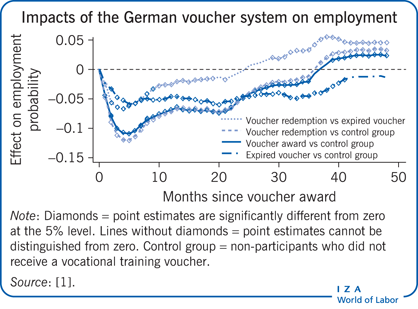Elevator pitch
The objective of providing vocational training for the unemployed is to increase their chances of re-employment and human capital accumulation. In comparison to mandatory course assignment by case workers, the awarding of vouchers increases recipients’ freedom to choose between different courses and makes non-redemption a possibility. In addition, vouchers may introduce market mechanisms between training providers. However, empirical evidence suggests that voucher allocation mechanisms prolong the unemployment duration of training participants. But, after an initial period of deterioration, better long-term employment opportunities are possible.

Key findings
Pros
Vouchers can increase consumer sovereignty, market transparency, and competition among training providers.
Awarding vocational training vouchers improves recipients’ long-term employment opportunities.
In terms of long-term employment opportunities, participation in short-duration vocational training programs is found to be more effective with voucher provision than mandatory course assignment.
More counseling by case workers during the course search phase is associated with higher earnings gains for training participants.
Cons
Employment opportunities are lower for awardees during training participation than for non-voucher recipients.
Vocational training under a voucher provision system can prolong unemployment duration compared to a mandatory course assignment system.
The unemployed with expired vouchers have reduced short-term employment probabilities.
Case workers’ ability to sanction and supervise program participants is limited under many voucher provision systems.